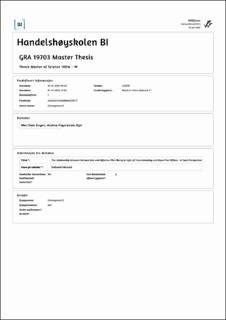| dc.description.abstract | The purpose of this study was to investigate the relationship between extraversion and affective well-being for employees working both in an open plan office setting and telecommuting (working from home). Existing research have investigated related topics and many assumptions have been hypothesized, but few relationships have been investigated and the research is still scarce. In the present study, we identified that individuals with lower scores on the Extraversion facet sociability experience lower affective well-being when working in open plan offices compared to those with higher sociability scores. Similarly, we found that individuals with lower scores on the energy level facet of extraversion experience lower affective well-being when working in open plan offices than those with higher energy level scores. These findings indicate that introverts experience less affective well-being than extraverts when working in open plan offices. Although
this previously has been hypothesized in literature and in the popular press, the research has been scarce. Moreover, we found that individuals with lower sociability scores experience higher affective well-being than those with higher sociability scores when telecommuting (working from home), indicating that introverts experience higher affective well-being when working from the comfort of their own home than do extraverts. This was especially interesting as this presumption has been debated in the research field. However, we were not able to demonstrate a statistically significant relationship between energy level-score and affective well-being. Overall, the findings may have important practical implications for organizations, concerning potential positive and negative consequences for facilitating flexible working schemes and telecommuting, which is a current topic of debate for practitioners in the aftermath of the COVID-19 pandemic. | en_US |
